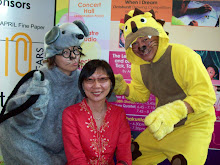The mentor moment: think creatively
By John Bittleston
The article is published on today's My Paper, 16 Dec 2009, page A6
I like the article and the way he expanded the concept of creativity.
Instead of cutting the paper and keep it, I thought it will be nice to have an e-copy to share with like-minded. I was thrilled to find the article on terrificmentors.com, the bonus of reading it online is, you have the choice of reading the text or listening to the audio:
http://www.terrificmentors.com/2009/12/11/think-creatively/
I like many of his thought and here are some that I would like to quote and share:
"Everyone thinks they are creative; very few people actually are."
"If we can get over the fear of failure we can think creatively. "
'The four Nobel Prize winners who discovered penicillin did not have financial accounts or Key Performance Indicators."
"Of the seven rules for being creative observation, ... is the first."
"Creativity is the ability to perceive relationships."
'You perceive only when you are alert"
"We score an “A” for focus and a “Z” for peripheral vision."
'Sensitivity is the most difficult of the creative tools."
"Insensitive people cause most of the accidents in the world. They don’t have their antennae tuned to danger. It can be fatal."
"Reflection is the tool that is hardest to define. It is part analysis, part interpretation, part projection."
"Humour is, to me, the most important of all the tools, and the most neglected."
"If creativity is the ability to perceive relationships, humour is the ability to create them."
"Vision and foresight are ways of describing imagination."
"Imagination is itself creativity, so not an ingredient."
"To achieve foresight we must forecast."
"Every decision in life is based on forecast."
"Foresight is extrapolating what we know. Vision is seeing what we cannot see. Together they form a vital element of creativity."
"Problem solving means overcoming an unresolved obstacle in order to achieve a desired objective."
"Problems are a mixture of trouble (sometimes potentially disastrous), inconvenience, emotional upset, irritation and opportunity."
"Unfortunately, we often let the emotional aspects of a problem cloud the usually simple solution."
"If we approached each problem with the question ‘what do I want to achieve?’ and forgot all the side issues we should see the solution quickly."
"With easy access to data why do we need memory?"
"The very speed of today’s communication determines what we must be able to call up without delay – or miss an opportunity that may not present itself again."
"The rule for modern memory is relevance. Where in the past showing off knowledge was often a way to command respect we now need to demonstrate that the knowledge we are displaying is relevant to the subject and, even more important, to the moment."
"My rule is to try to remember the future, not the past."
"Stories – and exercises – are the best way to learn creativity"
"What of the educational needs for creativity? We admire teachers and those educating the young. They are hugely important. But they are stuck in knowledge-based formula teaching quite unsuitable for our present needs."
"Today we must have a new, broader-based form of education encompassing the 98% of the brain we are not using."
"Such education is not about fact and experience but about imagination and creativity."
"I am what I eat; I become what I think; I will be what I decide."
I like the article very much and read it again and again!
Listening to the audio when I write this blog make me reflect on my understanding, you may like to do the same and get the full text or audio from:
http://www.terrificmentors.com/2009/12/11/think-creatively/
Wednesday, December 16, 2009
Subscribe to:
Post Comments (Atom)


1 comment:
Thank you
Post a Comment